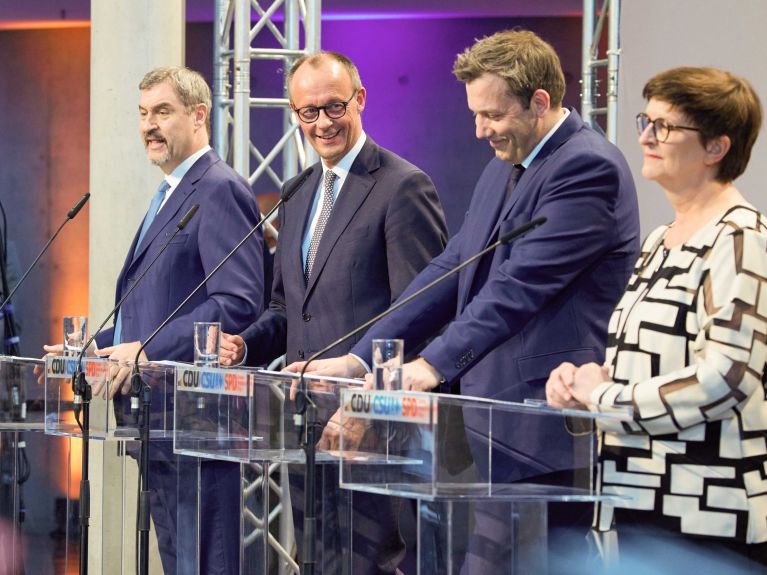The CDU/CSU and SPD coalition treaty: what it contains
The CDU/CSU and the SPD have agreed on their programme for government. An overview of its central points.

Following several weeks of coalition negotiations, the Christian Democratic Union of Germany / Christian Social Union (CDU/CSU) and the Social Democratic Party of Germany (SPD) have set out their plans for a coalition government in a treaty. Here are their plans for key issues:
Taxes and financial relief
The income tax rate for people on low and middle incomes is to be reduced in around two years’ time. The solidarity surcharge will remain in place for top earners and businesses. From 2026, the commuter allowance is to total 38 cents from the first kilometre. The Deutschlandticket (Germany ticket, currently costing 58 euros per month) is to continue to be available beyond 2025. Passengers can expect price increases from 2029, however.
Easing the burden on companies, and the economy
The depreciation rules are to be reformed to ease the tax burden on companies: a degressive depreciation rate of 30 percent on equipment investments will be introduced for the period 2025 to 2027. From 2028, the plan is to gradually lower corporate tax. The German Supply Chain Act is to be abolished and replaced by the EU Supply Chain Directive, which will be implemented without excessive bureaucracy.
National budget and administration
To reduce expenditure, eight percent of jobs in federal administration are to be cut within four years - security agencies are exempt. The number of federal commissioners is to be halved. In total, a billion euros is to be saved by reducing funding programmes and contributions to international organisations. Municipalities with high levels of old debt will be supported by the Federal Government with 250 million euros per year - as a 50 percent contribution if federal states assume the municipalities’ cash advances.
Migration and asylum
It will be possible to turn asylum seekers back at the external borders of the EU in coordination with European partners. All constitutional means to combat irregular migration are to be exploited, without violating the right of asylum. Five years of residency will still be required to become eligible for naturalisation, and dual citizenship will continue to be permitted. Refugees with subsidiary protection status will not be allowed to bring family members to Germany for two years.
Energy and industry
The controversial “heating law” is to be withdrawn and replaced by a new Building Energy Act designed to be more open to different technologies, more flexible and simpler. An industry electricity price is to apply to energy-intensive industries to boost their competitiveness.
Pensions and social security
The 48 percent pension level is to be guaranteed by law until 2031. This will be funded via the federal budget. The “mothers’ pension” will be expanded: regardless of the years in which a mother’s children were born, three pension points are to be added - likewise funded out of tax revenues.
Citizen’s benefit and the labour market
Payment of the citizen’s benefit is to be tied to an increased duty to cooperate. If a recipient repeatedly refuses to accept a job they can be reasonably expected to work in, their benefits can be fully withdrawn. The benefit is to be known in future as the “basic benefit for job seekers”.
In future, flexible weekly working hours could apply instead of the eight-hour day - in consultation with employers and trade unions. From the coming year, a minimum wage of 15 euros per hour is planned.
Education and funding
The Bafög, the state support for pupils and students, will be increased from next year. The cost of living allowance for students not living in their parental home will be raised from 380 to 440 euros per month. To address poor performance at primary school level, compulsory language and development tests are to be introduced for four-year-olds nationwide.
Defence and internal security
A voluntary military service model is planned for the German armed forces, the Bundeswehr. To this end, military registration and monitoring structures are to be put in place. In addition, there are plans to establish a national security council that would pool information about crises and enable quicker decisions to be taken. To strengthen internal security, telecommunications providers will in future be required to store IP addresses for a period of three months for investigation purposes.
Families and parents
The parental allowance is set to rise - both the minimum 300 euro payment and the maximum 1,800 euro rate are to be increased. Self-employed mothers are to receive a legal entitlement to maternity leave.
Cannabis
The current legalised status of cannabis for adults is to be reviewed.
Review of Covid-19 policy
The measures taken by the state in response to the Covid-19 pandemic are to be reviewed. A committee of inquiry is to be set up for this purpose.
Dieses YouTube-Video kann in einem neuen Tab abgespielt werden
YouTube öffnenThird party content
We use YouTube to embed content that may collect data about your activity. Please review the details and accept the service to see this content.
Open consent form


